单元重点 牛津5b
牛津英语5B单元知识总复习

6、He can put a grape on his nose. 7、David learns a lot from this book. 8、The hot coffee near the clock is for the doctor. 9、Mike and I have four lessons in the morning. 10、The girl in red studies very hard every day. 11、Stand in a line.
二、将下列句子改为一般疑问句。 1、We are Chinese. 2、My mother and my brother love that fat monkey. 3、The student uses a computer to write music. 4、The puppet jumps and runs around on the bus. 5、He’s showing his stamps to his friends. 6、It has six arms.
三、一般疑问句
如何将一个肯定的陈述句改为一般疑问句: 如何将一个肯定的陈述句改为一般疑问句: 看句中有无be动词,如有, be动词提到句首即可 be动词 动词提到句首即可。 1、看句中有无be动词,如有,把be动词提到句首即可。 看句中有无情态动词,如有,把情态动词提到句首即可。 2、看句中有无情态动词,如有,把情态动词提到句首即可。 如上述二者都没有,就应把助动提到句首。分四个步骤: 3、如上述二者都没有,就应把助动提到句首。分四个步骤: 肯定陈述句中本来是没有助动词的,要加上去,位置在主语( (1)肯定陈述句中本来是没有助动词的,要加上去,位置在主语(某 人或某物) 动词前。 人或某物)后,动词前。 确定助动词用do还是does 根据句中动词, do还是does, (2)确定助动词用do还是does,根据句中动词,动词是原形的助动词 就用do 动词是第三人称单数的助动词就用does do, 就用do,动词是第三人称单数的助动词就用does 把助动词后提到句首。 (3)把助动词后提到句首。 原句中动词假如发生变化就要恢复成原形。 (4)原句中动词假如发生变化就要恢复成原形。 强调一点, some的要考虑是否要用any。 的要考虑是否要用any 强调一点,有some的要考虑是否要用any。 I am reading this book.
牛津英语5b英语单元重点词组与句子
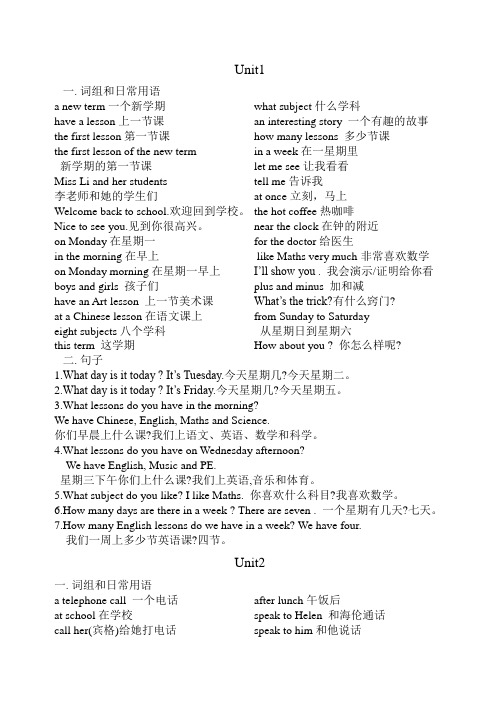
Unit1 一.词组和日常用语a new term一个新学期have a lesson上一节课the first lesson第一节课the first lesson of the new term新学期的第一节课Miss Li and her students李老师和她的学生们Welcome back to school.欢迎回到学校。
Nice to see you.见到你很高兴。
on Monday在星期一in the morning在早上on Monday morning在星期一早上boys and girls 孩子们have an Art lesson 上一节美术课at a Chinese lesson在语文课上eight subjects八个学科this term 这学期what subject什么学科an interesting story 一个有趣的故事how many lessons 多少节课in a week在一星期里let me see让我看看tell me告诉我at once立刻,马上the hot coffee热咖啡near the clock在钟的附近for the doctor给医生like Maths very much非常喜欢数学I’ll show you . 我会演示/证明给你看plus and minus 加和减What’s the trick?有什么窍门?from Sunday to Saturday从星期日到星期六How about you ? 你怎么样呢?二.句子1.What day is it today ? It’s Tuesday.今天星期几?今天星期二。
2.What day is it today ? It’s Friday.今天星期几?今天星期五。
3.What lessons do you have in the morning?We have Chinese, English, Maths and Science.你们早晨上什么课?我们上语文、英语、数学和科学。
牛津版5B各单元复习
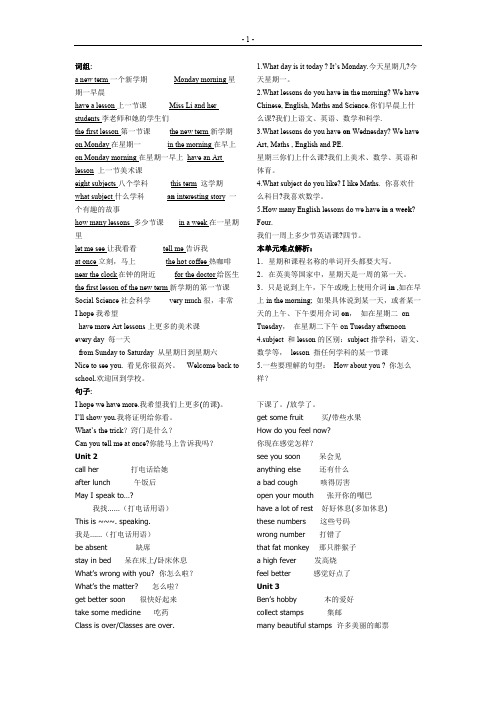
词组:a new term一个新学期Monday morning星期一早晨have a lesson上一节课Miss Li and her students李老师和她的学生们the first lesson第一节课 the new term新学期on Monday在星期一in the morning在早上on Monday morning在星期一早上have an Art lesson 上一节美术课eight subjects八个学科this term 这学期what subject什么学科an interesting story 一个有趣的故事how many lessons 多少节课in a week在一星期里let me see让我看看 tell me告诉我at once立刻,马上the hot coffee热咖啡near the clock在钟的附近for the doctor给医生the first lesson of the new term新学期的第一节课Social Science社会科学 very much很,非常I hope我希望have more Art lessons上更多的美术课every day 每一天from Sunday to Saturday 从星期日到星期六Nice to see you. 看见你很高兴。
Welcome back to school.欢迎回到学校。
句子: 1.What day is it today ? It’s Monday.今天星期几?今天星期一。
2.What lessons do you have in the morning? We have Chinese, English, Maths and Science.你们早晨上什么课?我们上语文、英语、数学和科学.3.What lessons do you have on Wednesday? We have Art, Maths , English and PE.星期三你们上什么课?我们上美术、数学、英语和体育。
(word完整版)上海牛津英语5B语法知识点复习,推荐文档
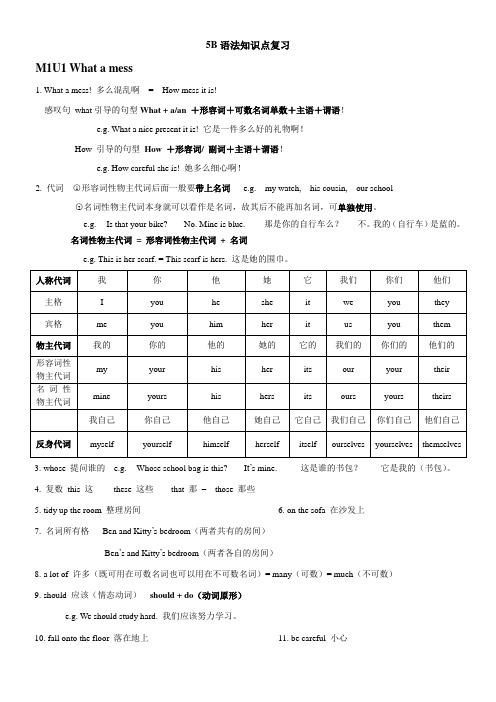
5B语法知识点复习M1U1 What a mess1. What a mess! 多么混乱啊= How mess it is!感叹句what引导的句型What + a/an +形容词+可数名词单数+主语+谓语!e.g. What a nice present it is! 它是一件多么好的礼物啊!How 引导的句型How +形容词/ 副词+主语+谓语!e.g. How careful she is! 她多么细心啊!2. 代词○1形容词性物主代词后面一般要带上名词 e.g. my watch, his cousin, our school○2名词性物主代词本身就可以看作是名词,故其后不能再加名词,可单独使用。
e.g. -- Is that your bike? -- No. Mine is blue. -- 那是你的自行车么?-- 不。
我的(自行车)是蓝的。
名词性物主代词= 形容词性物主代词+ 名词e.g. This is her scarf. = This scarf is hers. 这是她的围巾。
3. whose 提问谁的 e.g. -- Whose school bag is this? -- I t’s mine. -- 这是谁的书包?-- 它是我的(书包)。
4. 复数this 这- these 这些that 那–those 那些5. tidy up the room 整理房间6. on the sofa 在沙发上7. 名词所有格Ben and Kitty’s bedroom(两者共有的房间)Ben’s and Kitty’s bedroom(两者各自的房间)8. a lot of 许多(既可用在可数名词也可以用在不可数名词)= many(可数)= much(不可数)9. should 应该(情态动词)should + do(动词原形)e.g. We should study hard. 我们应该努力学习。
牛津小学英语5B知识点(全)
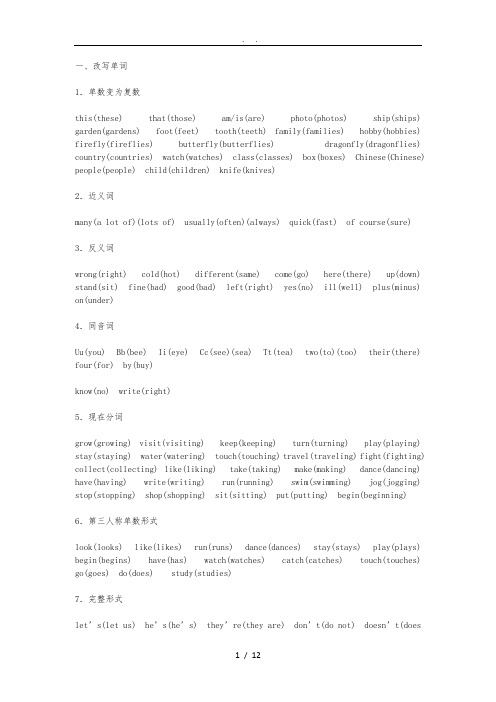
一、改写单词1.单数变为复数this(these) that(those) am/is(are) photo(photos) ship(ships) garden(gardens) foot(feet) tooth(teeth) family(families) hobby(hobbies) firefly(fireflies) butterfly(butterflies) dragonfly(dragonflies) country(countries) watch(watches) class(classes) box(boxes) Chinese(Chinese) people(people) child(children) knife(knives)2.近义词many(a lot of)(lots of) usually(often)(always) quick(fast) of course(sure)3.反义词wrong(right) cold(hot) different(same) come(go) here(there) up(down) stand(sit) fine(bad) good(bad) left(right) yes(no) ill(well) plus(minus) on(under)4.同音词Uu(you) Bb(bee) Ii(eye) Cc(see)(sea) Tt(tea) two(to)(too) their(there) four(for) by(buy)know(no) write(right)5.现在分词grow(growing) visit(visiting) keep(keeping) turn(turning) play(playing) stay(staying) water(watering) touch(touching) travel(traveling) fight(fighting) collect(collecting) like(liking) take(taking) make(making) dance(dancing) have(having) write(writing) run(running) swim(swimming) jog(jogging) stop(stopping) shop(shopping) sit(sitting) put(putting) begin(beginning)6.第三人称单数形式look(looks) like(likes) run(runs) dance(dances) stay(stays) play(plays) begin(begins) have(has) watch(watches) catch(catches) touch(touches) go(goes) do(does) study(studies)7.完整形式let’s(let us) he’s(he’s) they’re(they are) don’t(do not) doesn’t(doesnot) I’ve(I have) can’t(can not)8.名词所有格Ben(Ben’s)Mike(Mike’s) Su Yang(Su Yang’s) Helen(Helen’s)9.主格his(he) her(she) me(I) them(they) your(you) us(we)10.宾格she(her) he(him) I(me) you(you) they(them) we(us) it(it)二、改写句子1.对画线部分提问It’s half past ten. (What time is it?)The students are in the sprots hall. (Where are the students?)My uncle likes growing flowers. (What does your uncle like doing?)I feel better now. (How do you feel now?)I’ve got a high fever. (What’s wrong with you?)I come from Japan. (Where do you come from?)She is from China. (Where is she from?)The girl in red is my sister. (Which girl is your sister?)Tom comes from the USA.(Who comes from the USA?)2.改为一般疑问句I’m taking some medicine. (Are you taking any medicine?)She feels very tired. (Does she feel tired?)I want to fly a kite. (Do you want to fly a kite?)The boy is standing. (Is the boy standing?)He lives in a small town. (Does he live in a small town?)They can play the piano. (Can they play the piano?)3.改为否定句My mother is taking some medicine. (My mother isn’t taking any medicine.) She can mak e clothes. (She can’t make clothes.)He works from Monday to Friday. (He doesn’t work from Monday to Friday.) They’re buying food in the shop. (they aren’t buying food in the shop.) They play table tennis every day. (They don’t play table tennis every d ay.) That is Jan’s umbrella. (改为同义句)That umbrella is Jan’s.It’s time to have breakfast. (改为同义句)It’s time for breakfast./It’s time for having breakfast.Who is absent today? (改为同义句)Who is not here today?I’m going to the library now. (改为祈使句)Don’t go to the library now.The man puts the plate on his finger. (改为现在进行时)The man is putting the plate on his finger.They are our good friends. (改为单数形式)He is my good friend.They usually do housework on Sundays. (改为单数形式)He usually does housework on Sunday.三、连词成句think, is, today, Saturday, I (.) (I think today is Saturday.) you, can, me, tell (?) (Can you tell me?)I, to, go, China, hope, I, can (.) (I hope I can go to China.) this, subject, you, do, what, like, term (?)(What subject do you like this term?)lesson, it, the, new, the, of, term, is first (.)(It is the first lesson of the new term.)is, stamps, he, showing, to, friends, his, his (.)(He is showing his stamps to his friends.)she, does, making, like, ships, model (?)(Does she like making model ships?)with, what’s, you, wrong (?) (What’s wrong with you?)have, lessons, I, in, four, the, morning (.)(I have four lessons in the morning.)goes, from, he, Friday, to, Monday, school, to (.)(He goes to school from Monday to Friday.)subjects, study, what, he, at, does, school (?)(What subjects do you study at school?)hobby, stamps, is, Ben’s, collecting (.)(Ben’s hobby is collecting stamps.)you, in, what, do, lessons, the have, morning (?)(What lessons do you have in the morning?)you, why, absent, are, today (?) (Why are you absent today?) left, right, Ton, three, turn, times, and (.)(Turn left and right three times, Tom.)you, touch, your, your, head, can, with, hands(?)(Can you touch your head with your hands?)lie, do, on, not, your, back(.)(Do not lie on your back.) putting, the, is man, on, the, apple, finger, his (.)(The man is putting the apple on his finger.)are, the, lesson, students, where, having, a PE (?)(Where are the students having a PE lesson?)fingers, many, does, how, the, have, monkey (?)(How many fingers does the monkey have?)has, a, David, day, busy (.) (David has a busy day.)a, game, basketball, this, there, evening, is (.)(There is a basketball game this evening.)what, it, is, time, now, Ben(?) (What time is it now,Ben?) you, thirsty, feel, do (?) (Do you feel thirsty?)begins, English, at, to, fifteen, our, lesson, ten (.)(Our English lesson begins at fifteen to ten.)like, Mike, does, to, English, speak (?)(Does Mike like to speak English?)same, Tom, are, Jason, From, country, the and (.) (Tom and Jason are from the same country.)are, the, Miss, talking, Wang, students, to (.) (The students are talking to Miss Wang.)want, do, New York, you, go, to, around (?)(Do you want to go around New York?)teaches, he, in, school, English, a, primary (.) (He teaches English in a primary school.)it, today, what, is day(?) (What day is it today?) is, think, interesting, I, English (.)(I think English is very interesting.)us, meet, come, and, here(.)(Come here and meet us.) an, , he, writing, is, his, teacher, to (.)(He is writing an to his teacher.)四、中译英(一)词组1 在周一上午(on Monday morning)2读英语(read English)3上一节美术课(have an Art lesson)4一节有趣的课(an interesting lesson)5上更多的课(have more lesson)6每天(every day)7马上(at once)8午饭后(after lunch)9感到很热(feel hot)10重感冒(a bad cold)11.休息(have a rest)12看医生(see a doctor)13吃一些药(take some medicine)14感到好些了(feel better)15在周三(on Wednesday)16星期四下午(Thursday afternoon)17七门科目(seven subjects)18在一周(in a week)19对…说话(speak to…)20打给我(call me)21患了咳嗽(get a cough)22怎么了(what’s wrong)23在学校(at school)24呆在床上(stay in bed )25错误(wrong number )26拍照(take photos )27集邮(collect stamps)28一位老同学(an old classmate)29一艘轮船(a ship )30购物(go shopping)31种树(grow the trees)32听音乐(listen to music)33出示…给…(show to… )34看一看(have a look)35养金鱼(keep goldfish)36一封(an )37同龄(the same age)38在一个小镇上(in a small town)39一封给我姐姐的信(a letter to my sister) 40居住(live in)41小房子(a small house)42从…到…(from…to…)43安静地坐(sit quietly)44在我家附近(near my home)45做衣服(make clothes)46上学(go to school)47放学后(after school)48做运动(do sports)49一动物邮票(an animal stamp)50拍照(take photos)51养狗(keep dogs)52相同的爱好(the same hobby)53写歌曲(write music)54上网(surf the Internet)55足球踢得好(play football well)56快速地停(stop quickly )57在每周六(on every Saturday)58读报(read newspaper)59浇花(water flowers)60打乒乓球(play table tennis)61弹钢琴(play the piano)62照看(look after)63仔细听(listen carefully)64抬起你的右腿(lift up your right leg)65向左转十次(turn left ten times)66上下跳两次(jump up and down two times)67把他们移到教室(move them to the classroom) 68站成四排(stand in four lines)69发出命令(give orders)70把你的手放在一起(put your hands together) 71弯曲你的膝盖(bend your knees)72做一些早锻炼(do some morning exercise)73在他的背上(on his back)74在体育课上(at a PE lesson)75在体育馆里(in the sports hall)76碰你的手臂(touch your arm)77抬起(lift up)78仰躺(lie on one’s back)79做家庭作业(do one’s homework)80做家务(do housework)81刷牙(brush teeth)82洗脸(wash face)83在八点半(at half past eight)84值日(on duty )85十点三刻(a quarter to eleven)86让我们快点(let’s hurry)87忙碌的一天(a busy day)88十点十分(ten past ten)89没有时间休息(have no time for rest)90从早到晚(from morning to night)91吃一些面包(have somebread)92谈论他们的家庭(talk about their family)93当然(of course)94从书中学到很多(learn a lot from the book) 95搬运一只红色的盒子(carry a red box)96捉蚂蚁(catch ants)97去跑步(go running)98度周末(spend weekends)99团队合作(group work )100在夜间发光(glow at night)101英语俱乐部(the English club)102不同的国家(different countries)103喜欢旅游(live traveling )104一个美国男孩(an American boy)105说法语(speak French)106长城(the Great Wall)107园林(the gardens in Su Zhou)108与…交谈(talk to…)109三个中国男孩(three Chinese boys)110在日本(in Japan)111儿童俱乐部(the Children’s club)112一位忙碌的参观者(a busy visitor)113访问澳大利亚(visit Australia)114一只勇敢的蚂蚁(a brave ant)115一法国地图(a map of France)116去爬山(go climbing )117捉昆虫(catch insects)118游览中国(go around China)119试着…(try to… )120在周末(at the weekends)(二)句子1、小男孩正站在他父亲的肩膀上。
牛津英语5B重点句型总结

牛津英语5B重点句型总结M1U1 Use your eyes!使用你的眼睛S1: Close your eyes. 闭上你的眼睛。
S2: Open your eyes. Can you see my shadow?睁开你的眼睛。
你能看见我的影子吗?S1: Is it behind the blackboard? 它是在黑板的后面吗?S2: Yes!/No! 是的!/不!Use these words: behind the 在…后outside the 在…之外under the 在…下面in the 在…里面on the 在…上面beside the 在…旁边at the top of 顶端above上空near 附近between中间S1: Have you got any apples? 你有一些苹果吗?S2: Yes, I’ve got some apples. Red ones or green ones?是的,我有一些苹果。
要一个红的还是一个绿的?/Sorry, I haven’t got any apples.对不起,我没有一些苹果。
S1: Red ones, please.请给我一个红的。
S1: Have you got any oranges? 你有一些桔子吗?S2: Yes, I’ve got some oranges. 是的,我有一些桔子。
S1: I can’t see. Where are they? 我没看见。
它们在哪儿?S2: They’re inside the box . 在盒子里面Use these words: inside the box在盒子里outside the box在盒子外behind 在…后in front of在…前面beside在…旁边M1U2 Use your ears! 使用你的耳朵S1: Do you want both hammers, Dad? 爸爸,这两个锤子都要吗?S2: No, the small one, please.不,要小的那个。
牛津小学英语5B Unit 1 单元教学内容简析

牛津小学英语5B Unit 1 单元教学内容简析《牛津小学英语 5B Unit 1 单元教学内容简析》牛津小学英语 5B Unit 1 是小学英语学习中的重要单元,涵盖了丰富多样的语言知识和技能训练。
本单元的主题为“A new term”,围绕新学期的开始,展开了一系列与学习生活相关的话题。
一、单元词汇本单元的词汇主要包括学科名称、星期名称以及一些与学校生活相关的常用词汇。
学科名称如:Chinese(语文)、English(英语)、Maths(数学)、Science(科学)、Social Science(社会科学)等。
这些词汇是学生在描述课程安排时必不可少的基础。
星期名称有:Monday(星期一)、Tuesday(星期二)、Wednesday(星期三)、Thursday(星期四)、Friday(星期五)、Saturday(星期六)、Sunday(星期日)。
学生通过学习这些词汇,能够准确表达每周的日程安排。
此外,还有诸如“lesson(课)”“subject(学科;科目)”“PE(体育)”“Art(美术)”等常用词汇,为学生构建了丰富的学校生活词汇库。
二、句型结构1、“What day is it today? It's” 用于询问和回答今天是星期几。
这一句型在日常交流中非常实用,帮助学生掌握星期的表达和运用。
2、“What lessons do you have in the morning/afternoon? We have” 用于询问和回答上午/下午有哪些课程。
通过这一句型,学生能够清晰地表达自己的课程安排。
3、“How many do you have? I have” 用于询问和回答拥有的数量,如课程数量、书本数量等。
三、语法要点1、一般现在时的运用在本单元中较为突出。
学生需要理解并能够运用一般现在时来描述日常的学习和生活安排。
2、名词复数形式也是本单元的一个重要语法点。
如“lessons”“subjects”等,学生需要掌握名词由单数变为复数的规则。
(完整word版)沪教版牛津英语5BM1U1知识点

单词:1. mess /e/ 杂乱;不整洁2. school bag /u:/ 书包3. brush(es) /∧/ 毛笔;画笔4. notebook /əu//u/ 笔记本5. paints /ei/ 绘画颜料6. crayon /er//ə/ 蜡笔7. tape /ei/ 胶带8. glue /u:/胶水9. mine /ai/我的10. his /I/ 他的11. hers /ə:/ 她的12. ours /əu /əz/ 我们的13. theirs /eə/ 他们的14. yours /uə/你(们)的15. whose /u:/ 谁的16. picture book /I/图画书17. storybook /ɔ:/故事书18. T-shirt /ə:/ T恤衫19. scarf /a:/围巾20. hat /æ/ 帽子21. gloves /∧/ 手套22. shoes /u:/ 鞋子23. magic // 有魔力的24. magnet /æ//I/磁铁25. nail /eI/ 钉子26. put /u/ 放;安置27. think /I/想;认为28. workshop /ə://ɔ/车间;工场;作方29. sharp /a:/ 锋利的30. blunt /∧/ 纯的31. try /ai/ 试试词组1. tidy up 收拾;整理2. a magic stone 一块魔石3. in his father’s workshop在他父亲的车间里4. a lot of nails许多钉子5. fall onto ……掉到……上面6. fall onto the floor 掉到地板上7. stick to 粘住;粘贴8. hard and smooth 有硬又光滑句子1.Whose school bag is this? It’s mine//yours/his/hers/ Kitty’s.2.Whose brushes are these? They’re theirs/ours/yours/mine/ peter’s.3.Is it Danny’s? No, it’s not his, It’s Alice’s.4.Is it yours? Yes, it’s mine.5.Put her books on her desk. Don’t put them on the bed. Ok./All right.6.Are those storybooks hers? Yes, they are.7.This notebook is not mine. Mine is red.8.The crayons are yours. Yours are on the desk.9.This is not our classroom. Ours is big and clean.10.T hese school bag s are not Kitty’s and Danny’s. Theirs are new.11.I t’s her scarf. This scarf is hers.12.What should I do? 我该怎么办?13.What a mess!真乱呀!14.P ut the stone near the nails. 把石头放在钉子的附近。
牛津5BModule1 Unit4 Use your five senses!知识点梳理汇总

牛津5 B M o d u I e 1 U n i t4 Use your five senses! (一)单词1 . listen [,lis9∏] V.听2 .hear [hi。
] v.听到3 .save [seiv] v.救4. find [faind] v.发现5. tongue [t∆∏] n.舌头6. smell [smel] v.闻起来7. feel [,fi:1] v.感觉8. above [a,bΛv] PreP.在...上方9. thing [θiη]东西10. hard [ha:d]坚硬的11. taste [teist] v.品尝1 2.touch [tΛt∫] v.触摸1 3 same [seim] adj 相同的一样的14 different [,di⅛r9∏t] adj 不同的1 5poor [puθ, p》]贫穷的1 6.rich [rit∫] adj 富有的1 7.sell [sei] V 卖1 8 buy[bai] v .买1 9 goose [gu:s] n.鹅(geese 复数)20 .help [help] v.帮助21 .beanstalk ['bi:nstD:k] n.树藤22 .castle['ka:sl] n.城堡23 .giant ['d3ai3nt] n.巨人24 .golden ['gauldan] adj.金色的25 .slide [slaid] n.滑梯26 .corn [k3:n] n.(美)玉米;(英)谷物27 . adventure [ad'vent∫θ] n.冒险历(二)重点短语1) listen and hear 听2) with my ears用我的手3) smell with my nose 用鼻子闻4)look and see with my eyes 用眼睛看5) touch and feel with my hands 用手触摸和感觉6) taste with my tongue 用舌头品赏7) SupergirPs adventure超级女孩的冒险8) be lost 丢失9) three boys in a country park在国家公园的三个男孩10) fly above the country park 在国家公园上空飞11) find a small fire 找到一个小火堆12) hear a noise 听到噪声13) come on 力口油14) help sb (to) do sth帮助某人做某事15)shout at sb朝某人大喊大叫16) on an island 在小岛上17) save one's Iife挽救某人生命save us a lot of time 节约时间save water 节水18) taste these drinks 品尝这些饮料19) the same or different 一样的或是不一样的32) giant20) some golden eggs 一些金蛋21) be poor at 不擅长22) sell sth to sb = sell sb sth 卖给某人某物23) buy sb sth = buy sth to sb 给某人买某物24) climb up 爬上climb down 爬下25) a golden goose 一个金鹅26) lay golden eggs 生金蛋27)the rich 富人the poor 穷人28) go home 回家29) under his arm 夹着...30) chase =run after 追赶31) have a picnic 吃野餐66) super32) look nice看起来好看33) be different from 和 .. 不一样34) be the same as 和... 一样(≡)知识点解析1学习听、闻、看、触、尝五个感官动词。
上海牛津英语5b知识点汇总
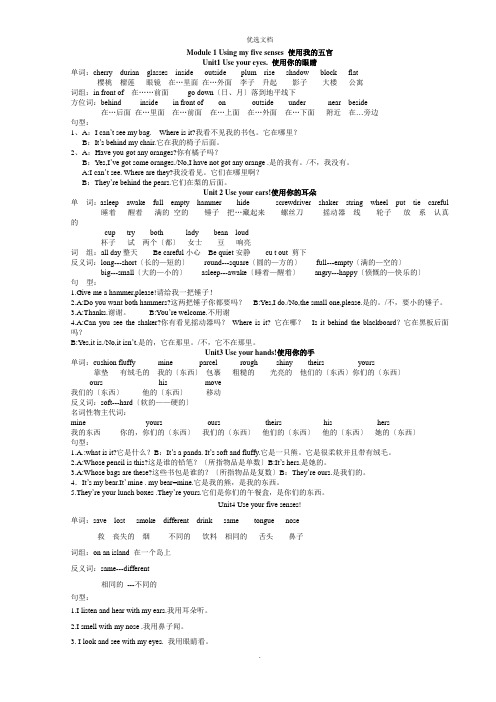
Module 1 Using my five senses 使用我的五官Unit1 Use your eyes. 使用你的眼睛单词:cherry durian glasses inside outside plum rise shadow block flat樱桃榴莲眼镜在…里面在…外面李子升起影子大楼公寓词组:in front of 在……前面go down〔日、月〕落到地平线下方位词:behind inside in front of on outside under near beside在…后面在…里面在…前面在…上面在…外面在…下面附近在…旁边句型:1、A:I can’t see my bag. Where is it?我看不见我的书包。
它在哪里?B:It’s behind my chair.它在我的椅子后面。
2、A:Have you got any oranges?你有橘子吗?B:Yes,I’ve got some oranges./No,I have not got any orange .是的我有。
/不,我没有。
A:I can’t see. Where are they?我没看见。
它们在哪里啊?B:They’re behind the pears.它们在梨的后面。
Unit 2 Use your ears!使用你的耳朵单词:asleep awake full empty hammer hide screwdriver shaker string wheel put tie careful 睡着醒着满的空的锤子把…藏起来螺丝刀摇动器线轮子放系认真的cup try both lady bean loud杯子试两个〔都〕女士豆响亮词组:all day整天Be careful小心Be quiet安静cu t out 剪下反义词:long---short〔长的—短的〕round---square〔圆的—方的〕full---empty〔满的—空的〕big---small〔大的—小的〕asleep---awake〔睡着—醒着〕angry---happy〔愤慨的—快乐的〕句型:1.Give me a hammer,please!请给我一把锤子!2.A:Do you want both hammers?这两把锤子你都要吗?B:Yes,I do./No,the small one,please.是的。
牛津英语5B知识点总结
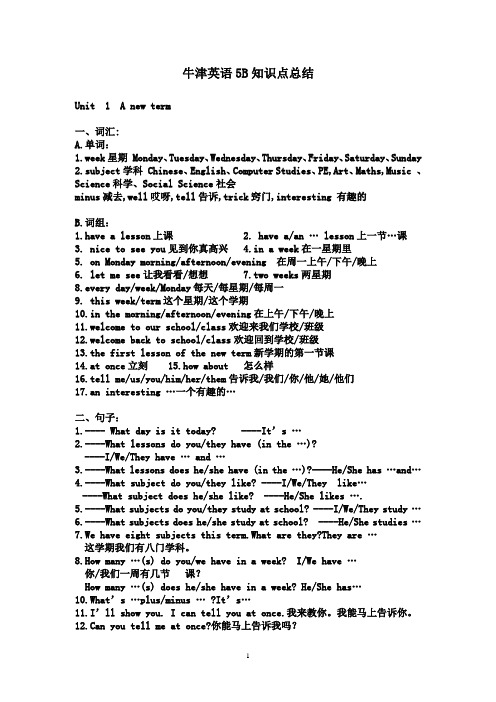
牛津英语5B知识点总结Unit 1 A new term一、词汇:A.单词:1.week星期 Monday、Tuesday、Wednesday、Thursday、Friday、Saturday、Sunday2.subject学科 Chinese、English、Computer Studies、PE,Art、Maths,Music 、Science科学、Social Science社会minus减去,well哎呀,tell告诉,trick窍门,interesting 有趣的B.词组:1.have a lesson上课2. have a/an … lesson上一节…课3. nice to see you见到你真高兴4.in a week在一星期里5. on Monday morning/afternoon/evening 在周一上午/下午/晚上6. let me see让我看看/想想7.two weeks两星期8.every day/week/Monday每天/每星期/每周一9. this week/term这个星期/这个学期10.in the morning/afternoon/evening在上午/下午/晚上11.welcome to our school/class欢迎来我们学校/班级12.welcome back to school/class欢迎回到学校/班级13.the first lesson of the new term新学期的第一节课14.at once立刻 15.how about 怎么样16.tell me/us/you/him/her/them告诉我/我们/你/他/她/他们17.an interesting …一个有趣的…二、句子:1.---- What day is it today? ----It’s …2.----What lessons do you/they have (in the …)?----I/We/They have … and …3.----What lessons does he/she have (in the …)?----He/She has …and…4.----What subject do you/they like? ----I/We/They like…----What subject does he/she like? ----He/She likes ….5.----What subjects do you/they study at school? ----I/We/They study …6.----What subjects does he/she study at school? ----He/She studies …7.We have eight subjects this term.Wha t are they?They are …这学期我们有八门学科。
牛津小学英语5B全部词汇

276.rat||鼠
277.red plum||杨梅
278.restaurant||餐馆
rug||毯子
280.season||季节
281.sheep||羊
282.shelf||架
283.shelf||架
284.sign||告示,标志
285.sofa||沙发
286.spring||春天
103.weather天气
104.were/are(过去)是/(现在)是
105.windy刮风的
106.12 April ( the twelfth April)四月十二日
107.a long time ago很久很久以前
108.above在上方
109.act out
表演出来
110.ago
以前
111.cream
大山,山脉
72.match
搭配,连线
73.inside
在里面
74.in pairs
两人一组
75.in front of
在前面
76.hill
小山,山丘
77.hide and seek
捉迷藏
78.hide
躲藏,躲避
79.flat
公寓
80.durian
榴莲
81.dictionary
字典
82.cut out
220.timetable
时间表
221.tourist
游客
222.true/false真实的/虚假的
223.try尝试
224.visit
访问,拜访
225.walk/go past
经过
226.wear
牛津5B 第二模块重点

牛津5B 第二模块重点单词短语句子Unit1单词:branch树枝cage笼子feed喂pond水池sign指示牌tiger老虎短语:half past eight 八点半walk up向上走walk along沿着…走on the left 在左边on the right在右边go up 走上go down 走下plant house暖房at the top of 在顶部句子:1. What time do you feed the elephants?你几点喂大象?2.At half past eight. 在八点半。
3.What do they eat? 它们吃什么?4.How much hay do they eat? 它们吃多少干草?5.They eat 50 kilos of hay. 它们吃五十公斤干草。
6. When do you clean their cage. 你什么时候打扫它们的笼子?7.Where is\are…? …在哪?8.It’s …它在…Unit2单词:dinosaur恐龙favourite 最喜爱的puppet木偶skateboard滑板soldier士兵短语:live in 住在give sth to sb 把某物给某人give sb sth 给某人某物句子:1. Which bicycle do you like? 你喜欢哪辆自行车?2. I like both bicycles. 两辆自行车我都喜欢。
3. Which aeroplane do you like, Eddie?你喜欢哪个飞机,艾迪?4. I like all the aeroplanes. 我喜欢所有的飞机。
5.Who has a bicycle?谁有自行车?6.I have a bicycle. 我有自行车。
7.What colour are the pandas? 这些熊猫是什么颜色的?8.They ‘re black and white.他们是黑白相间的。
牛津5B复习要点(单词句型词组)
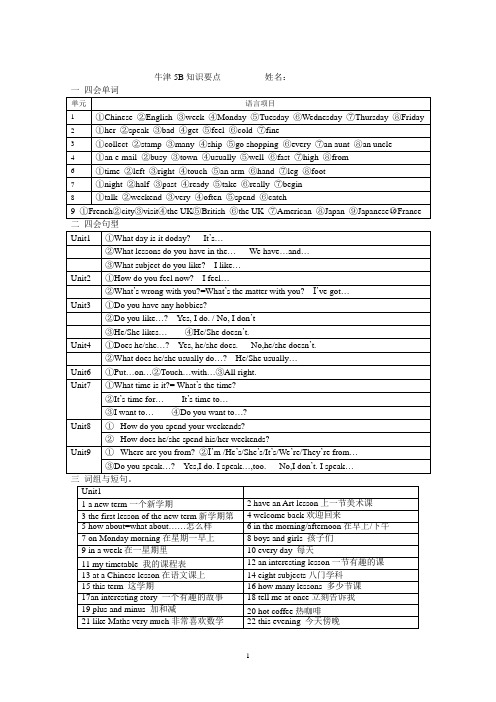
Unit2
①How do you feel now? I feel…
②What’s wrong with you?=What’s the matter with you? I’ve got…
Unit3
①Do you have any hobbies?
12 swim well游泳游得好
13 study Maths well数学学得好
14 an English friend一位英国朋友
15 from Monday to Friday从星期一到星期五
16 inthe computer room在电脑房里
17 under the tree在树下
18 every week每周
2 close the window关窗
3 call her给她打电话
4 after lunch午饭后
5 have a lot of rest多休息
6 speak to him和他说话
7abad cough一次严重的咳嗽
8abad cold一次重感冒
9 get a high fever.发高烧
10 be absent缺席
Unit 6
1 at a PE lesson在一节体育课上
2 give orders发命令
3 try to试着做某事
4 follow the orders跟随命令
5 stand in a line站成一排
6 lie on one’s back仰躺
7put your feet /knees together把你的双脚/膝并拢拢拢
9①French②city③visit④the UK⑤British⑥the UK⑦American⑧Japan⑨JapaneseFrance
2022年牛津小学5BUnit3单元复习笔记(通用7篇)
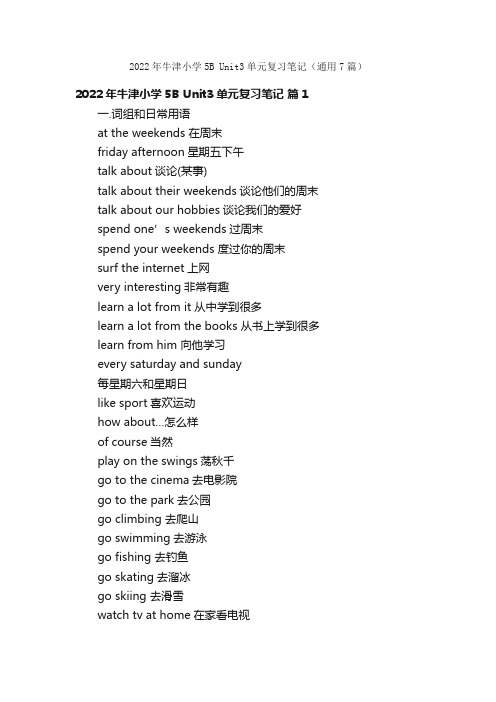
2022年牛津小学5B Unit3单元复习笔记(通用7篇)2022年牛津小学5B Unit3单元复习笔记篇1一.词组和日常用语at the weekends 在周末friday afternoon星期五下午talk about谈论(某事)talk about their weekends谈论他们的周末talk about our hobbies谈论我们的爱好spend one’s weekends过周末spend your weekends 度过你的周末surf the internet上网very interesting非常有趣learn a lot from it 从中学到很多learn a lot from the books 从书上学到很多learn from him 向他学习every saturday and sunday每星期六和星期日like sport喜欢运动how about…怎么样of course当然play on the swings荡秋千go to the cinema去电影院go to the park去公园go climbing 去爬山go swimming去游泳go fishing 去钓鱼go skating去溜冰go skiing 去滑雪watch tv at home在家看电视watch cartoons看动画片listen to music听音乐do housework做家务wash the clothes 洗衣服read english 读英语draw pictures画画clean the rooms打扫房间sing beautifully唱歌动听fly high飞得高our good friends 我们的好朋友primary school小学study at yu cai primary school在育才小学学习like insects very much非常喜欢昆虫a lot of insects许多昆虫other interesting insects其它有趣的昆虫watch ants观察蚂蚁carry big things搬运大东西dance in the flowers在花丛中跳舞catch butterflies捉蝴蝶catch fireflies 捕捉萤火虫put them in the bottles把它们放在瓶子里glow at night在夜晚发光sleep in the tree 在树上睡觉二.句子:1.how do you spend your weekends? i often go shopping.你怎样过周末的?我通常去购物。
- 1、下载文档前请自行甄别文档内容的完整性,平台不提供额外的编辑、内容补充、找答案等附加服务。
- 2、"仅部分预览"的文档,不可在线预览部分如存在完整性等问题,可反馈申请退款(可完整预览的文档不适用该条件!)。
- 3、如文档侵犯您的权益,请联系客服反馈,我们会尽快为您处理(人工客服工作时间:9:00-18:30)。
客厅 书房 整天 安静 餐厅 你为什么喜欢它? 因为它很大。 大雁 地方 搬家 一年两次 在南方 在北方 飞向南方 飞向北方 足够的食物 然后 大雁为什么搬家? 因为它们找不到足够的食物。
it 3
1.在未来 2.了解 3.站 4.在…前面 5.机器 6.照相 7.戴眼镜 8.将会\将不会 9.做操 10.擅长 11.不擅长 12.起得早 13.迟到 14.容易变累 15.努力学习 16.更多的 17.不再 18.锻炼 19.尝试 20.我将会成为老师 21.我将不会戴眼镜。
Unit 6
1. 一个完美的地方 2. 住在旅馆 3. 在海边 4. 吃海鲜 5. 美丽的海滩和清澈的海水 6. 在中国的南部 7. 许多美丽的蝴蝶 8. 一整年 9. 去游泳 10. 在海南岛上 11. 我们将要住在哪儿? 12. 我们将要在三亚待多久? 13. 我们将在三亚待7天。
Unit 6
Unit 7-8
开放日 在学校门口 描述一件事情的顺序 会议室 一间美术教室 把某人带到某地 为父母唱歌 询问某人关于某事 试穿 一条裤子 2双鞋子 一个国王 保持安静 许多钱 穿上 看一看 生病 发烧 感冒 咳嗽
Unit 12
Unit 11
1.春节(两种) 2.一个重要的节日 3.在春节的晚上 4.吃鱼和饺子 5.拜访亲戚和朋友 6.得到红包 7.看烟花 8.在中秋节 9.在重阳节 10.在…的末尾 11.放爆竹 12.吃月饼
Unit 10,12
1. 伟大的发明 2. 任何地点 3. 从一个地方到另一个地方旅行 4. 一张…的图片 5. 禁止入内 6. 对… 友好 7. 推倒 8. 玩得开心 9. 一个有着美丽花园的大房子 10. 用表告诉时间 11. 用相机照相
Unit 3
1.在未来 in the future 2.了解 know about 3.站 stand 4.在…前面 in front of 5.机器 machine 6.照相 take a photo 7.戴眼镜 wear glasses 8.将会\将不会 will\won’t 9.尝试try to 10.擅长 be good at 11.不擅长 be weak in 12.起得早 get up early 13.迟到 be late for 14.容易变累 get tired easily 15.努力学习 study hard 16.更多的more 17.不再not…any more 18.锻炼 do exercise 19.我将不会戴眼镜。I won’t wear glasses. 20.我将会成为老师. I’ll be a teacher.
Unit 1
1.多么乱啊!What a mess! 2.让我们整理一下它吧。Let’s tidy it up.(let’s =let us) 3.那些是谁的袜子?Whose socks are those? 4.它们是你的吗?Are they yours? 不,他们不是。No, they aren’t. 5.把… 放在…上面。Put… on… 6.谢谢你的帮助。Thank you for your help. 7.一把雨伞 an umbrella 8.蜡笔crayon 9.帽子cap 10.钉子nail 11.装满be full of 12.使落下,掉落drop 13.粘到… stick to 14.几个,一些(可数)a few 几个,一些(不可数)a little 15.秒second 16.形容性物主代词+名词=名词性物主代词
Unit 2
客厅living room 书房 study 整天 all day 安静 be quiet 餐厅 dining room 你为什么喜欢它? Why do you like it? 因为它那么大。Because it’s so big. 大雁wild goose 复数wild geese 地方place 搬家change home 一年两次twice every year 在南方in the south 在北方in the north 飞向南方 fly south 飞向北方fly north 足够的食物 enough food 然后 then 大雁为什么搬家?Why do wild geese change homes? 因为它们找不到足够的食物。Because they cannot find enough food.
Unit 4
1. 买书 2. 读故事书 3. 在那边 4. … 的图片 5. 参观这些地方 6. 字典 7. 读报纸 8. 读杂志 9. 做海报 10. 写关于 11. 照相 12. 做调查 13. 读剧本 14. 演出来 15. 在未来我会参观这些地方。
Unit 4
1. 买书 buy a book 2. 读故事书read a storybook 3. 在那边over there 4. … 的图片pictures of…… 5. 参观这些地方visit these places 6. 字典dictionary 7. 读报纸read a newspaper 8. 读杂志 read a magazine 9. 做海报 make a poster 10. 写关于write about 11. 照相take photos 12. 做调查do a survey 13. 读剧本 read a play 14. 演出来act out 15. 在未来我会参观这些地方。I will visit these places.
1. 一个完美的地方 a wonderful place 2. 住在旅馆stay in a hotel 3. 在海边 by the sea 4. 吃海鲜have seafood 5. 美丽的海滩和清澈的海水 beautiful beaches with clear water 6. 在中国的南部 in the south of China 7. 许多美丽的蝴蝶many beautiful butterflies 8. 一整年all year round 9. 去游泳 qo swimming 10. 在海南岛上on Hainan Island 11. 我们将要住在哪儿? Where will we stay? 12. 我们将要在三亚待多久?How long will we stay in Sanya? 13. 我们将在三亚待7天。We will stay in Sanya for seven days.
Unit 5
1. 1.在周末 2. 呆在家 3. 看电影 4. 划船 5. 没有计划 6. 明天 7. 哭 8. 找到一个秋千 9. 建筑 10. 直到 11. 你这个周末要去做什么? 12. 我打算踢足球。
Unit 5
1. 在周末 at the weekend 2. 呆在家 stay at home 3. 看电影 see a film 4. 划船 row a boat 5. 没有计划 have no plans 6. 明天 tomorrow = the next day 7. 哭cry 8. 找到一个秋千 find a swing 9. 建筑build 10. 直到明天 until tomorrow 11. 你这个周末要去做什么?What are you going to do this weekend? 12. 我打算踢足球。I’m going to play football.
